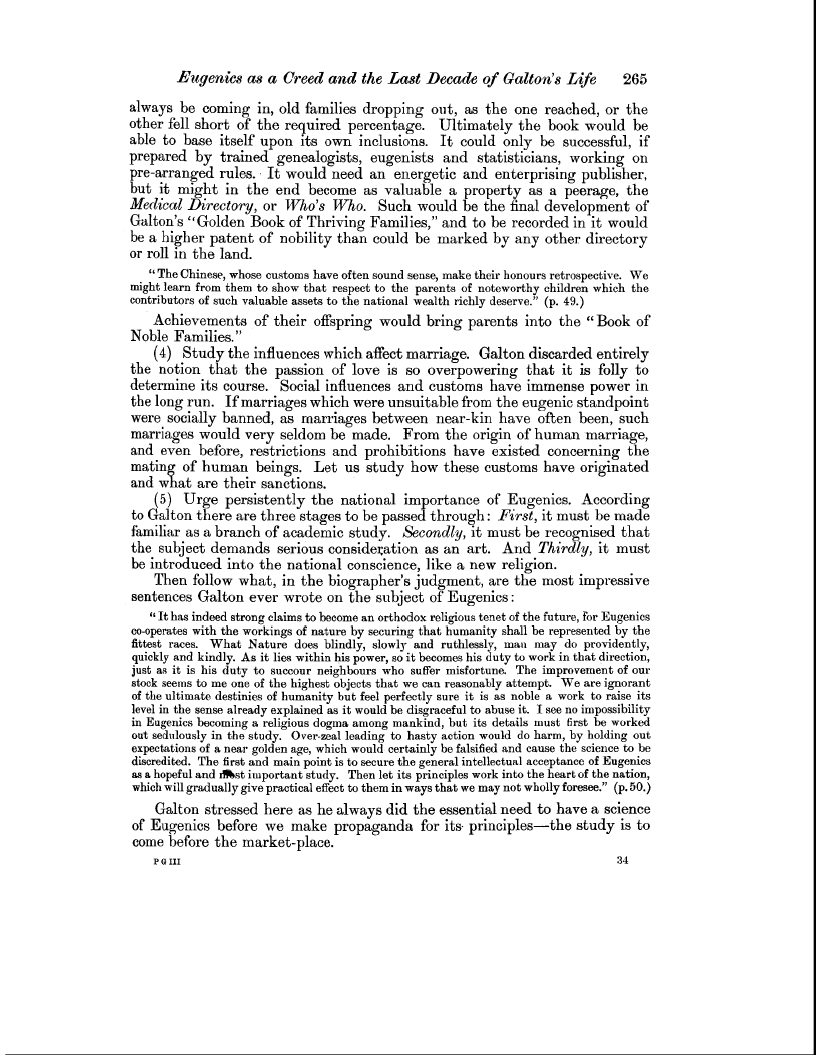| ||||||

OCR Rendition - approximate
|
| Previous | Index | Next |
Eugenics as a Creed and the Last Decade of Galton's Life 265
always be coming in, old families dropping out, as the one reached, or the other fell short of the required percentage. Ultimately the book would be able to base itself upon its own inclusions. It could only be successful, if prepared by trained genealogists, eugenists and statisticians, working on pre-arranged rules. - It would need an energetic and enterprising publisher, but it might in the end become as valuable a property as a peerage, the Medical Directory, or Who's Who. Such would be the final development of Galton's "Golden Book of Thriving Families," and to be recorded in it would be a higher patent of nobility than could be marked by any other directory or roll in the land.
" The Chinese, whose customs have often sound sense, make their honours retrospective. We might learn from them to show that respect to the parents of noteworthy children which the contributors of such valuable assets to the national wealth richly deserve." (p. 49.)
Achievements of their offspring would bring parents into the "Book of Noble Families."
(4) Study the influences which affect marriage. Galton discarded entirely the notion that the passion of love is so overpowering that it is folly to determine its course. Social influences and customs have immense power in the long run. If marriages which were unsuitable from the eugenic standpoint were socially banned, as marriages between near-kin have often been, such marriages would very seldom be made. From the origin of human marriage, and even before, restrictions and prohibitions have existed concerning the mating of human beings. Let us study how these customs have originated and what are their sanctions.
(5) Urge persistently the national importance of Eugenics. According to Galton there are three stages to be passed through: First, it must be made familiar as a branch of academic study. Secondly, it must be recognised that the subject demands serious consideiation as an art. And Thirdly, it must be introduced into the national conscience, like a new religion.
Then follow what, in the biographer's judgment, are the most impressive sentences Galton ever wrote on the subject of Eugenics
" It has indeed strong claims to become an orthodox religious tenet of the future, for Eugenics co-operates with the workings of nature by securing that humanity shall be represented by the fittest races. What Nature does blindly, slowly and ruthlessly, mau may do providently, quickly and kindly. As it lies within his power, so it becomes his duty to work in that direction, just as it is his duty to succour neighbours who suffer misfortune. The improvement of our stock seems to me one of the highest objects that we can reasonably attempt. We are ignorant of the ultimate destinies of humanity but feel perfectly sure it is as noble a work to raise its level in the sense already explained as it would be disgraceful to abuse it. I see no impossibility in Eugenics becoming a religious dogma among mankind, but its details must first be worked out sedulously in the study. Over-zeal leading to hasty action would do harm, by holding out expectations of a near golden age, which would certainly be falsified and cause the science to be discredited. The first and main point is to secure the general intellectual acceptance of Eugenics as a hopeful and rest important study. Then let its principles work into the heart of the nation,
which will gradually give practical effect to them in ways that we may not wholly foresee." (p. 50.)
Galton stressed here as he always did the essential need to have a science of Eugenics before we make propaganda for its- principles-the study is to come before the market-place.
P G 111 34
| Previous | Index | Next |